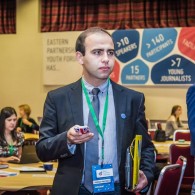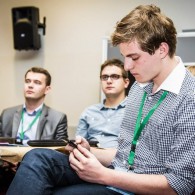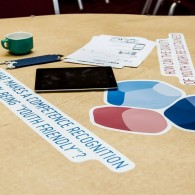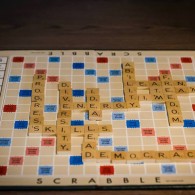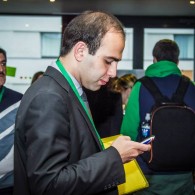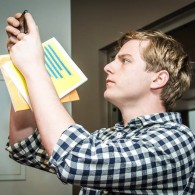Right before Autumn Agora Zaragoza, Armenak Minasyants (AEGEE-Yerevan) and Adrian Browarczyk (Eastern Partnership project) took part in the Eastern Partnership (EaP) Youth Forum in Kaunas. The AEGEEan interviewed them about the experience.
What made you interested in taking part in the EaP Youth Forum?
Armenak: Well, I was mostly interested to get to the EaP Youth Forum in Kaunas due to professional interest: being already Policy Officer on European Integration of AEGEE-Europe for a year, I have developed a position paper of our association on the matters related to the European Neighborhood Policy and this paper particularly includes a huge chapter on the EU Eastern Partnership Programme topics. In this framework, I believe, that we are somehow obliged to be present at such youth events and express our vision on the ongoing developments. At the same time, currently the EU EaP programme is probably in the most important phase since its launch back in 2009: Ukraine is on the brink of signing the Association Agreement and Deep Comprehensive Free Trade Agreement with the EU. In turn Moldova and Georgia are planning to initial the mentioned agreements. Unfortunately, we also witnessed in the last months the disappointing moves from my home country’s authorities, who retreated from their European path. So in complex, for me it was a matter of big professional importance to be in Kaunas and to exchange opinions with such a broad range of youth representatives and officials on the upcoming developments.
Adrian: It was quite obvious. Apart from my big interest in the Eastern Partnership issues and being the future Project Manager of AEGEE Eastern Partnership Project two (EaP2), I was also eager to participate in such an official gathering of active youth from all over the Europe. The idea appeared even at the very beginning of the year when I was a trainee at the Permanent Representation of the Republic of Poland to the Council of Europe. My country as one of the creators of the EaP programme played a crucial role in the intergovernmental consultations in regards to the EaP side of the Lithuanian presidency. That is why I decided to take part in one of the side events and, surely, the Eastern Partnership Youth Forum seemed the most interesting point in the agenda for the active EaPiees from AEGEE.
What has been your role in the event?
Armenak: I was involved in two working groups’ activities, which were discussing and sharing youth experience in the spheres of visibility of the youth projects in the EaP national levels, and evidence-based youth policy development on the European level. I presented in both occasions the approaches of our association, as well as AEGEE’s structure, upcoming projects and implemented activities in the EaP region within the last years. The activities in the working groups were done through the facilitation of the experienced moderators, thus giving everyone a very good chance not only to talk about abstract issues but to present concrete recommendations, which within the upcoming weeks would be provided to the European Commission, the Eastern Partnership countries national governments and of course to all the interested youth organisations, including AEGEE.
Adrian: I proudly represented AEGEE-Europe and our project as well, as I was a part of the Polish delegation to the Forum.
Why do you find Eastern Partnership important for AEGEE?
Armenak: Let me put it in the straight and simple way: we have proclaimed in the “Statement of Principles” the belief that we strive for an open and integrated Europe, with a sense of common identity, defined and united by shared values, taking diversity as its source of strength. We share our faith in a Europe standing for liberty, democracy, and respect for human rights and the rule of law, and our will is to cooperate with the European institutions that promote these concepts. In this regard as an important check point for us could be considered the launch of the Eastern Partnership, aimed to create and strengthen democracy, sustainable economic development, manage cross-border cooperation, assist to overcome the poverty and social inequalities in six post-soviet neighbouring states. For AEGEE this programme has vital importance, also bearing in mind the fact that our Association has more than 15 local representations/branches/locals in the Eastern Partnership region. My experience in AEGEE within the last year as a Policy Officer clearly shows that we need to support the further strengthening of these representations, assisting them foremost to overcome the existing barriers of the youth mobility. We need to strive for equal opportunities and possibilities of our members not only within the EU, but also the neighbouring countries, because these young people are the most “sensitive”. I have always stated that our association should react and assist all of its members, thus showing solidarity and supporting the principles of our organization. In diversity and integrated Europe lies our strength. The upcoming EaP Vilnius Summit is a crucial phase when the EaP countries are expected to demonstrate their dedication to further strengthening of the cooperation with the EU, which will directly affect also the young people coming from the EaP.
Adrian: It’s a very important dimension of today’s AEGEE policy. Seeing the things happening in there we can easily assume that the AEGEEans from the focus area become a jolly strong part of the Network because of their neverending motivation and activity visible in many fields. It is also important to all of us to make Europe bigger and present in every corner of the continent. AEGEE is a significant tool in the current integration processes in Europe, so why not spreading our spirit and values amongst the EaP youth? I see them as an equal part of the European community and our project will stand for it for sure!
Have you taken place in a similar event to this before?
Armenak: It was the first time for me to be a part of such a thematic project which gathers about 200 youth workers: the experience was really great. I hope that the upcoming EU presiding states would provide the sustainability of this format and that we will meet up on a regular basis.
Adrian: It was my first official event devoted to the European youth matters.
Have you gotten to see anything of Kaunas? What do you think about the city?
Armenak: Kaunas is an amazingly beautiful city: it was quite cold but our lovely organizers did their best and we got known with the city’s lovely scenes. Mostly I was impressed with the memorial dedicated to Romas Kalanta, who back in 1972, exclaimed “Freedom for Lithuania!” and immolated himself in the garden of the Musical Theatre of Kaunas, after making a speech denouncing the Soviet suppression of national and religious rights.
At the same time the youth spirit was everywhere: at the plenary rooms, restaurants, pubs, clubs – for sure I would love it a lot to visit the city once again.
Adrian: Kaunas is a lovely, academic city. A mix of medieval architecture with modern spirit. My first impression was that the city dives in the savage nature – two big rivers cross Kaunas and they are surrounded by vast forests. I did like the moments when I was passing through the streets in the city centre and I saw common names of streets and buildings, due to our joint Polish-Lithuanian past. I also really enjoyed a cup of coffee at the Market Place where one of the monuments standing by is fully white and is made of… bikes. Everything next to the well kept, red brick medieval castle.
What have you been doing at the event?
Armenak: Probably meeting our new and old partners or simply said: networking was the main point for me. Lots of creative ideas have been discussed and put on the table with very concrete steps for further implementation. I hope that these oral agreements would rise to future successful projects.
Adrian: With Armenak we took part in the working sessions during which we shared our experiences on working on the recognition of youth work and non-formal education with partners from almost every country in Europe. These meetings aimed to contribute to the youth policy reform in the EaP countries and EU member states as well. I also had a chain of unofficial meetings with the representatives of different youth organisations in order to stay in touch with them and to discuss the possible joint projects. As my roommate was Slovak working for the government, and as I met the activists from Polish neighbouring countries, I did exchange opinions on development of youth policy in my region (it was such a good experience as we shared our points of view with a EU-EaP mix with Ukraine and Belarus included).
How will you work with the outcome of the event?
Armenak: By the end of the project the facilitators/organizers presented some short conclusions of the Forum, which accordingly will become part of the final report and recommendations, which would be presented to the European Commission and the EaP countries’ governments prior to the EU EaP Vilnius Summit on November 29-30, 2013.
On the local level, all the participants are highly supported to make dissemination and promotion of the results of the Forum. And on the European level I hope that the recommendations would be useful for shaping our more structured approach in regard of the recognition of non-formal education in the EaP countries.
Adrian: I am already profiting from the outcomes of the Forum. I, meaning EaP2, am actively supporting the creation process of a side event to the Civil Society Forum that will probably take place next autumn in one of the programme countries. I do hope that the currently discussed topic of the event will follow the EaP2 thematic path and that the active citizenship, youth participation and structured dialogue will be amongst the initiative’s priorities. Moreover, I’m in touch with the youth EaP organisations which during the Forum expressed their high interest in our work profile. I truly believe that youth I have acquainted in Kaunas would not only be our partners, but also would become our/my best friends.
Written by Patricia Anthony, AEGEE-København
Pictures courtesy of Eastern Partnership Youth Forum


